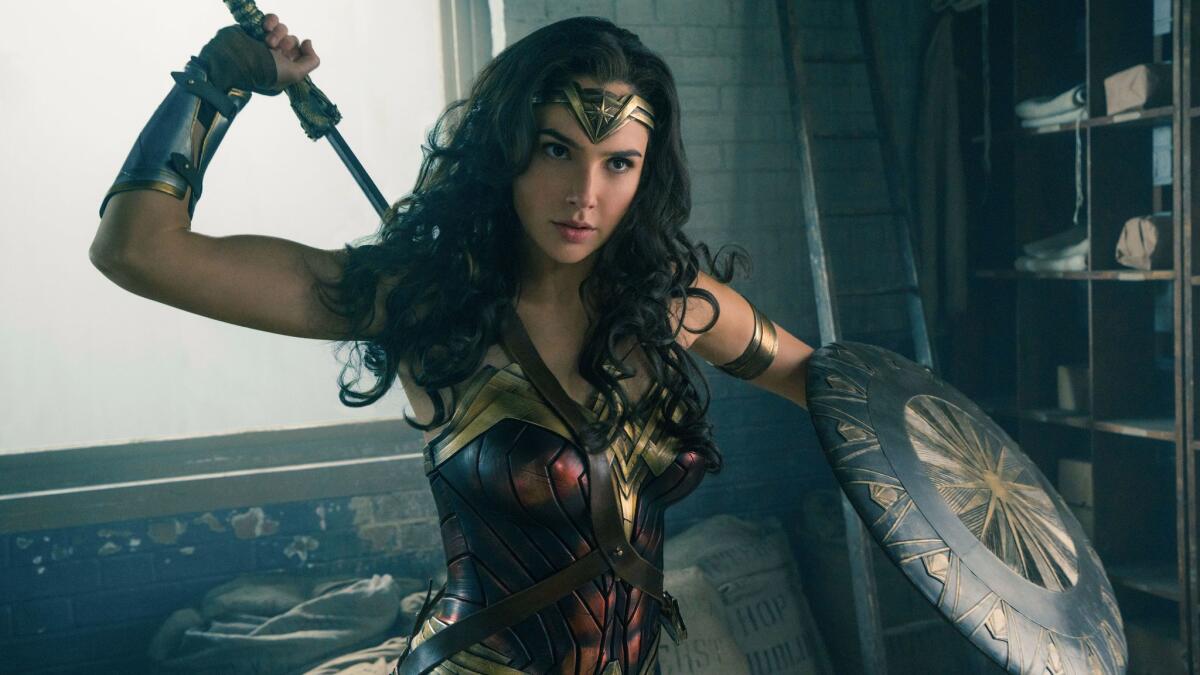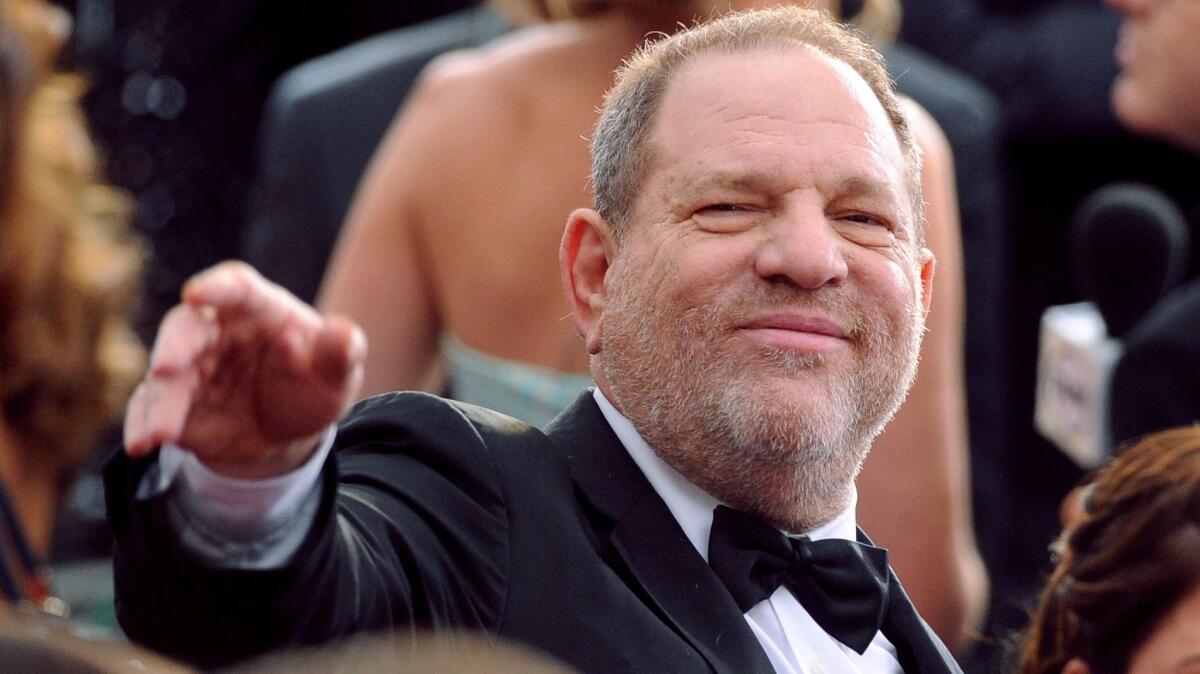Tweets, sexual abuse and racial divides shook the entertainment industry and beyond in 2017
- Share via
It was a year we couldn’t have fathomed, a year of strife and weirdness, a time of wild tweets and endless scandal, when movies gave us reflection, Ken Burns jolted us back to Vietnam, and the entertainment industry was shaken by sexual abuse accusations that raised disturbing questions about what’s behind the art, film and music that shape American culture.
The calendar began with arguments in the media over the crowd size at President Trump’s inauguration. It will end, at least by Hollywood’s rubric, with “The Post,” Steven Spielberg’s rendering of the Washington Post’s decision in 1971 to publish the classified Pentagon Papers that exposed U.S. lies around the war in Southeast Asia. There’s symmetry to those bookends, especially these days with the press covering a combative and secretive White House.
The year spun like a prickly edged whisper through mind and soul. The sublime — Greta Gerwig’s “Lady Bird” and Bruce Springsteen’s solo Broadway show — mixed with the eerie — Hulu’s “A Handmaid’s Tale” and Jeff Goodell’s book on global warming, “The Water Will Come” — and non-stop “Saturday Night Live” spoofs as Alec Baldwin channeled Trump and Melissa McCarthy summoned former press secretary Sean Spicer. They soothed, alarmed and enthralled, as only mirrors can do.
FULL COVERAGE: Year-end entertainment 2018 »
The masterful PBS series “The Vietnam War”, directed by Burns and Lynn Novick, reexamined an American tragedy with a freshness that spoke to a nation now torn by cultural battles, racial divisions, sexual misconduct and gender politics. The 18-hour documentary was partly a reminder that the upheavals of the 1960s and early ’70s, more lacerating even than our current turmoil, marked the advent of a media era that would saturate and reshape us and a half-century later deliver a reality TV star to the Oval Office.
As Trump sharpened the intersection of celebrity and politics, art and film were often bested by an increasingly toxic reality. Around-the-clock news and churning social media — an ether of self-expression and selective journalism that further eroded the reach of networks and cable — were more riveting, if less redemptive and poetic, than the imaginations of our most clever and inventive screenwriters and showrunners. Facts upended our fictions; transgressions sullied our escapism. Netflix rewrote “House of Cards” after its star — and president — Kevin Spacey was accused of sexual misconduct and fired.

Yearnings for metaphor and meaning abounded. We found acceptance of ‘the other’ in Guillermo del Toro’s “The Shape of Water,” glimpsed the working-class in Steven Soderbergh’s “Logan Lucky” and Craig Gillespie’s “I, Tonya,” envisioned female empowerment in Patty Jenkins’ “Wonder Woman” and skewered racists and liberals in Jordan Peele’s “Get Out.”
America’s unease for many, however, was articulated by a character in Salman Rushdie’s new novel, “The Golden House,” the tale of a billionaire patriarch named Nero, an allusion to the emperor who ruled when ancient Rome burned.
“What would my story mean, my life, my work, the stories of Americans old and new, Mayflower families and Americans proudly sworn in just in time to share in the unmasking — the unmaking — of America. Why even try to understand the human condition if humanity revealed itself as grotesque, dark, not worth it. What was the point of poetry, cinema, art. Let goodness wither on the vine. Let Paradise be lost. The America I loved, gone with the wind.”
Hollywood started the year pleased with itself after — shall we say the ‘incident’ — when Warren Beatty and Faye Dunaway, suaveness disintegrating into puzzlement, opened the wrong envelope and awarded “La La Land” the Academy Award for best picture. Drama, shock, a few expletives, a Jimmy Kimmel consolation (“nobody died”), and things were set right just before everyone rushed off to the Governor’s Ball.
“Moonlight,” a gay coming-of-age tale by a black cast and director, was the real winner. The movie industry appeared to be rising beyond #OscarsSoWhite. Years of white, male dominance gave way to a greater inclusion of people of color, women and foreigners. Films that arrived later such as, “Get Out,” a satirical horror meditation, and “Mudbound,” a look at color barriers in 1940s Mississippi, slyly and sensitively dealt with racism and the power of the African American narrative. It was a victory, even if the upcoming list of Oscar nominees is likely again to be mostly white.
“It’s certainly been a year of electric shock therapy. The most jolting kind where people’s assumptions and ways of thinking and reacting to the political world have profoundly shifted,” said Robert Greenwald, founder of Brave New Films, which produces socially themed documentaries. “Hollywood is just beginning to come to grips with how white the film and television industries are and how to change it. Hopefully, this will lead to more diversity that will affect the entire culture.”
At times, when it seemed our better selves had abandoned us, art spoke with redeeming power. Days after neo-Nazis and white supremacists marched in Charlottesville, Va., “Hamilton”, the hip-hop, immigrant story of founding father Alexander Hamilton, opened (finally) in Los Angeles with a multicultural cast and a message of shared promise. The expanse between those two moments is where much of America lies, an anxious land where super heroes glimmer and songs like “I’m Not Racist” by rapper Joyner Lucas bring incendiary poetry to the black-white divide.

Then in an instant that seemed as fore-ordained as it was startling, Harvey Weinstein burst into headlines, not for his eloquent movies but for rape accusations brought against him. His was the tidal break that spurred similar allegations against a gallery of men, including Brett Ratner, Louis CK, James Toback, Charlie Rose, Matt Lauer and Spacey. The entertainment industry became a Rorschach test for the wider culture as questions arose around how do we (or should we) separate the art from the artist.
The accusations spurred deep examinations of gender relationships and power. If it wasn’t quite a happy ending, there was a sense of justice coming. That was evident this month when Time magazine named “The Silence Breakers,” women and men who shared and responded to accusations of sexual abuse, as its Person of the Year.
“It feels like something has shifted,” Jane Fonda told MSNBC’s Chris Hayes. “It’s too bad that it’s probably because so many of the women that were assaulted by Harvey Weinstein are famous and white and everybody knows them. This has been going on a long time to black women and other women of color, and it doesn’t get out quite the same.”
It feels like something has shifted. It’s too bad that it’s probably because so many of the women that were assaulted by Harvey Weinstein are famous and white.
— Jane Fonda
The Weinstein scandal arrived as “The Deuce,” a piercing look at the 1970s sex industry by David Simon and George Pelecanos, aired on HBO. Exploited women appeared to be piling up in real life and in fantasy, and, if one were contemplating the nation’s Puritan roots, the veneer separating repressed sexuality and unabashed salaciousness was shattered with undeniable reckoning. A different math was suddenly in the air.
In a scene that is at once funny and sad, Candy, an entrepreneurial New York prostitute played by Maggie Gyllenhaal, warns other street walkers not to be taken advantage of when acting in peep show films: “Every time some guy puts a coin in one of those machines, someone’s making money off of what you did, you’re not making another dime.”
How to navigate that sentiment is one of Hollywood’s enduring traits. As the year came to an end, wildfires scorched Bel-Air; Trump, with no sense of irony, tweeted about the sexual claims against Lauer; and Charles Manson, the twisted son of another age, died, reminding us of “Helter Skelter” and our fascination with the villainous. Manson is a ghost who hasn’t dissolved. Vietnam too.
Even Winston Churchill, played with aplomb by Gary Oldman, stormed back in our consciousness in “Darkest Hour.” Churchill — the 20th century’s paragon of good against evil and a final vestige of white, colonial power — left his imprint on our consciousness through other works as well: “The Crown,” “Dunkirk” and “Finest Hour.”
Years often splice the old with the new. They tick by and leave marks, some profound, others not. If we are lucky, our art distills the best and worst of them and sometimes offers the escape that Michael Shannon saw in his film, “The Shape of Water,” about a love affair between an exotic fish-like creature and a cleaning lady.
“It’s an oasis from the ugliness and nastiness that seems to be pervasive during this time,” he said. “I’m not sure the movie can solve anybody’s problems or make your breakfast in the morning, but it’s so damn beautiful.”
See the most-read stories this hour »
Twitter: @JeffreyLAT
ALSO
Who’s next? High anxiety in Hollywood
The high jinks and despair of the Southern man from ‘Smokey and the Bandit’ to the new ‘Logan Lucky’
Considering ‘Mad Max’ and other Hollywood dystopias after Trump’s exit from Paris accord
More to Read
Only good movies
Get the Indie Focus newsletter, Mark Olsen's weekly guide to the world of cinema.
You may occasionally receive promotional content from the Los Angeles Times.











